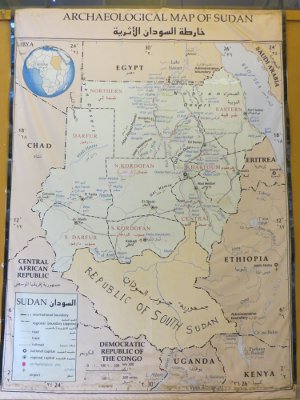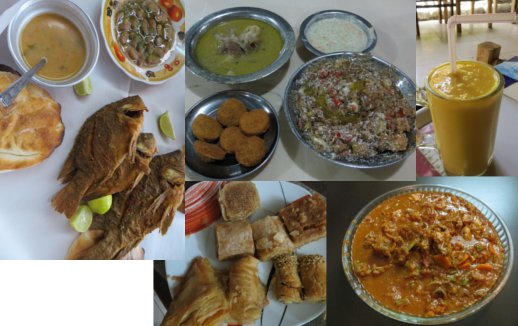Best of Sudan
We visited Sudan for 8 days since April 22, 2014 and traveled a total of 22.5 hours by bus making stops in Khartoum and Wadi Halfa. During our days in Africa, people frequently confused us as Israelis and with the objective of preventing any possible issues in the Muslim countries, Sal shaved his beard the night before entering Sudan. With his new look, long hair in a ponytail, he was finally associated with Latin American, someone also gave him the funny nickname of “Antonio Banderas”.
From the beginning to the end of our stay in Sudan, we felt embraced by Sudanese hospitality. Immigration officers, government officials, and civilians welcomed us with a smile, tea, a conversation, and their genuine help. We discovered that the real treasure of this nation isn’t the oil underneath it’s soil but the caring spirit of their people. Everywhere we went, they were unbelievably generous, courteous, and happy to have us. Only one thing made us sad about Sudan: the bureaucracy and extreme control played by the government. If you want to learn more about how amazing the Sudanese were to us and help challenge your brain of any negative image or fear you may have of this nation, you should take a look at our article.

In Sudan we were delighted by their people, cuisine and culture. We were happy eating pita bread, fuul (beans), falafel, vegetables, sheep meat, and fish with our hands. We were mesmerized with the beautiful hands and feet of married women painted with henna. We enjoyed learning how to write the Arabic numbers from 0 to 9 and played to recognize them in every street sign. We discovered interesting things about Islamic faith and lifestyle, including that weekends are Friday to Saturday and Sunday is a regular working day. Islam means submission to, and acceptance of, God. It is derived from the Arabic verb aslama, meaning to surrender or to submit. One important thing to remember about Islamic beliefs is that it is intended to be a system of rules for all aspects of life, based on faith. The devoted Muslim must adhere to Five Pillars of Islam: The first pillar is that there is only one God, and that no other is worthy of worship, no man is recognized from divine origin; the second pillar is the ritual prayer, which must be performed five times a day, each prayer must be performed in the direction of the Great Mosque at Mecca, birthplace of Mohammed and center of the Islamic World. Prayers take place early morning (sunrise), just after midday, between 3 and 3:30 pm, in the evening just before sunset, and about one hour after sunset. The third pillar is the practice of alms-giving or zabat, all Muslim who can afford it are expected to pay a portion of their income to help the poor and assist the spread of Islam. The fourth pillar is the practice of fasting during the holy month of Ramadan. The fifth pillar is the famous pilgrimage to Mecca in Saudi Arabia during the Islamic month of Dhu al-Hijjah. Every able-bodied Muslim who can afford it is expected to make the pilgrimage at least once in his or her lifetime.
Before the separation of the south and the north, Sudan was the largest country in Africa by land area and the tenth largest in the world. The north of the country is typified by a predominantly Muslim population, unified by a common belief in Islam, while the south brings together numerous tribal divisions, many at war with one another. A strong resistance religious movement against Egyptian-British started in 1898. Ahmed proclaimed himself to be Mahdi, the prophesied redeemer of Islam. Many battles were fought and lives were sacrificed until achieving independence in January 1, 1956. Since then, the country has suffered many years of civil war, which can be divided into two phases. The first one lasted 17 years from 1955 to 1972. The second one started in 1983, and only ended with the signing of the Comprehensive Peace Agreement (CPA) in 2005. This war should not be seen as north versus south or as Muslim versus non-Muslim but as a fight to withhold all oil incomes in which religion was used, once again, as a strategy to polarize and mobilize people against each other. Officially, Khartoum is no longer at war with the south, but the peace situation remains a precarious one.
Sudan’s most famous topographical landmark is probably the Nile River. The Blue and the White Nile meet in Khartoum to form a single body of water that flows northwards through Egypt until reaching the Mediterranean Sea. We finished our stay in Sudan traveling by ferry on the Nile from Wadi Halfa, Sudan to Aswan, Egypt. We slept on our camping mats at the top deck of the boat enjoying a fresh breeze under the stars. The night was lovely. All the struggles of getting the ferry tickets were worth it. The nostalgia of leaving Sudan and their people was so deep within us. How different would our world be if more people could be as kind and caring as the Sudanese are…
Below are other great things we enjoyed about Sudan:
Food and Drinks
Fuul: Fava Beans
Hummus: mashed chick peas
Fried Nile Fish
Sheep Meat in Tomato Sauce
Falafel: fried chick peas with spices

Favorite Sights and Activities
The Genuine Kindness of the Sudanese People
Spending our Last Night in Sudan under the Stars on a Ferry to Egypt on the Nile River
Seeing the Confluence of the Blue and White Niles
People
Titi: from Sudan, our CouchSurfing host in Khartoum, a great CouchSurfing ambassador.
Ayman: from Sudan, Titi’s friend.
Wathig: from Sudan, Titi’s friend.
Native Words (Arabic)
We learned to read the numbers in Arabic
Shukran = Thank you
Salahma a lekum = Hello (Peace on you)
